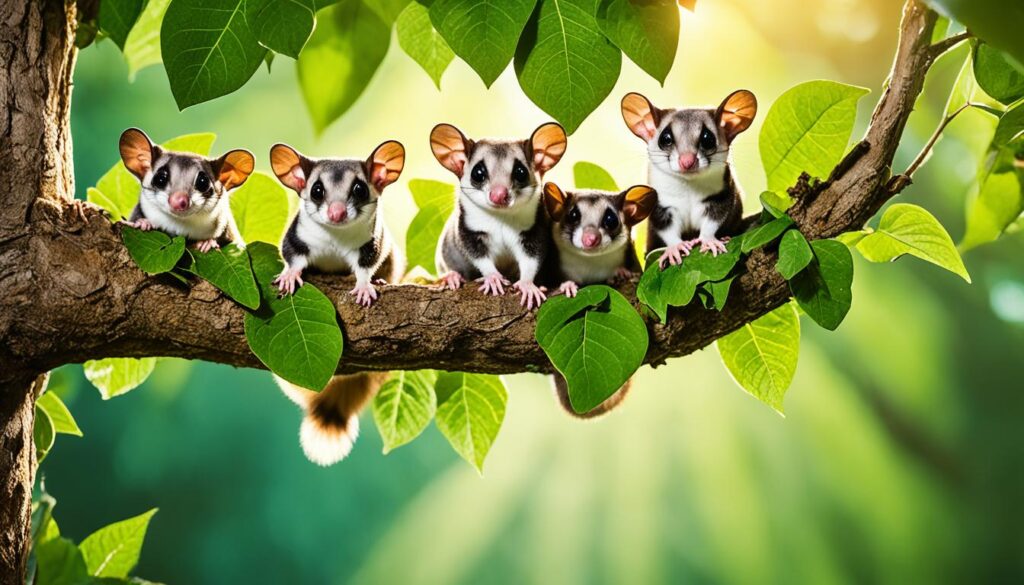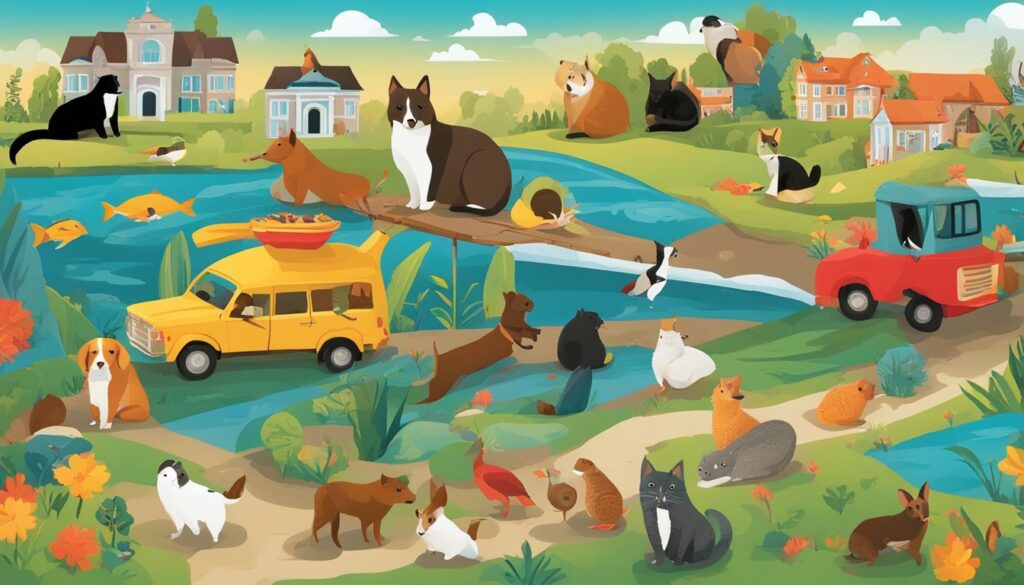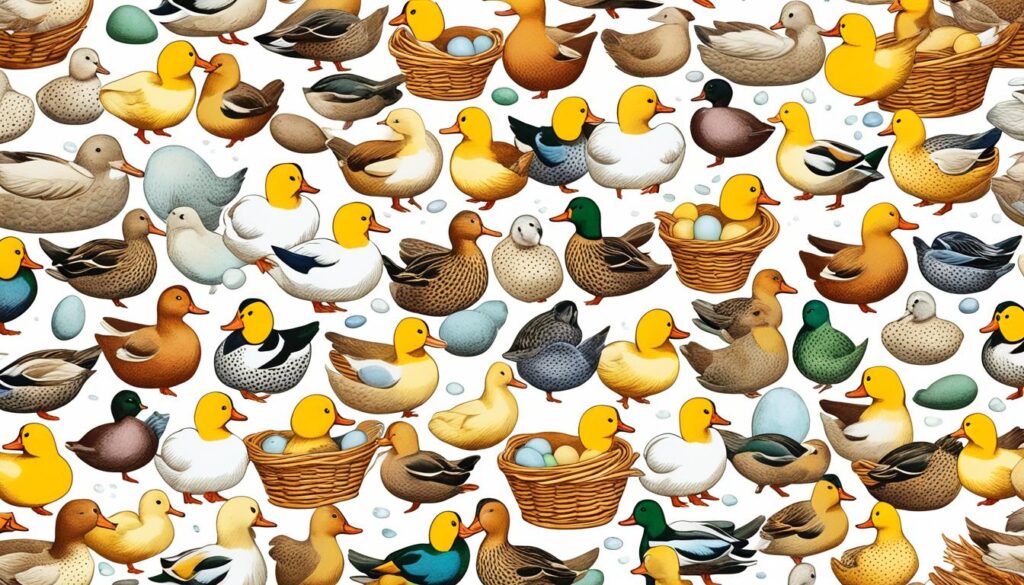Did you know 1 in 5 homes in Georgia has a wild or exotic pet? The state is full of interesting animals, but most are not allowed as pets. It’s important to know the laws about pets in Georgia for responsible ownership.
This guide will cover what pets you can legally own in Georgia. We’ll look at common pets and some exotic ones too. If you’re thinking of getting a new pet, this article will help you understand Georgia’s pet laws.
Key Takeaways
- Most native wildlife in Georgia cannot be kept as pets without proper permits and licenses.
- Certain nuisance species like rats, mice, and armadillos are exceptions to the rule.
- Georgia has strict regulations on exotic pets, including restrictions on specific mammals, birds, reptiles, and amphibians.
- Sugar gliders and European ferrets are among the limited exotic pets allowed in Georgia with proper documentation.
- Obtaining the necessary permits and licenses is crucial for responsible pet ownership in the state.
Understanding Georgia’s Pet Laws
Georgia has strict laws about owning pets, including domestic and exotic ones. It’s illegal to keep most native wildlife and many exotic animals as pets. This is because it’s hard and risky to keep wild animals in captivity.
Why Wild Animals Make Poor Pets
Young wild animals change a lot as they grow, becoming aggressive and hard to manage. They need different food and living conditions than pets, which can lead to health problems and malnutrition. Also, they can spread diseases to people.
Georgia’s Animal Protection Act says that cruelty to animals can get you up to a year in jail. If it’s more serious, you could get five years. The Responsible Dog Ownership Law makes owners of dangerous dogs get liability insurance of at least $50,000. Breaking this law can lead to charges and losing your dogs.
In Georgia, hurting animals on purpose is a crime. Watching dogfights is also a crime, and it’s a felony to break dogfighting laws. You could get fined and even go to jail.
The Equine Liability Act in Georgia protects horses and llamas from lawsuits for normal risks of their activities. But, if someone is not careful and someone gets hurt, they could be liable. The Endangered Wildlife Protection Act makes it a crime to break rules meant to protect endangered animals.
In Georgia, trapping animals for their fur has rules. Traps must be checked every 24 hours, or it’s a crime. It’s also illegal to harm animals for fun, profit, or sport.
Exceptions for Nuisance Species
Georgia’s pet laws might seem strict, but there are exceptions for certain native “nuisance” species. According to Georgia wildlife regulations, people can legally take and keep species like rats, mice, armadillos, coyotes, and more. These animals are seen as nuisances because they can harm local wildlife or be a risk to humans.
But, remember, you need permits or licenses for some of these animals. For example, you need a license for armadillos, coyotes, and beaver. Also, you need a license for freshwater turtles and mussels, and for any species on Georgia’s Protected Wildlife List.
| Nuisance Species | Permit/License Required |
|---|---|
| Rats, Mice, Armadillos, Coyotes, Groundhogs, Beaver, Freshwater Turtles, Venomous Snakes, Frogs, Spring Lizards, Fiddler Crabs, Freshwater Crayfish, Freshwater Mussels | No permit required |
| Live Armadillos, Coyotes, Groundhogs, Beaver | Permit or license required |
| Freshwater Turtles, Mussels, Species on Protected Wildlife List | License required for possession or collection |
All birds found in the wild in Georgia are protected by law, except for a few types. These include English sparrows, European starlings, and pigeons. Also, the state protects many fish in its waters.
“Georgia Law prohibits the taking of wildlife without proper permits or licenses. However, exceptions are made for the collection of certain nuisance species.”
It’s crucial to know the rules and get the right permits or licenses before taking or keeping any wildlife in Georgia.
Prohibited Native Mammals in Georgia
Georgia has strict rules about owning native mammals. This includes bats, black bears, bobcats, and many others. These animals can’t be kept as pets, no matter where they come from or what they look like.
This rule is part of Georgia’s effort to protect wildlife and keep people safe. Since 1994, owning, selling, or breeding these wild animals as pets is now more restricted. Owners must register and tag their animals with the Georgia Department of Natural Resources within a year.
| Prohibited Native Mammals in Georgia |
|---|
| Bats |
| Black bears |
| Bobcats |
| Chipmunks |
| Cottontail rabbits |
| Coyotes |
| Cougars |
| Flying squirrels |
| Foxes |
| Groundhogs |
| Opossums |
| Raccoons |
| Skunks |
| White-tailed deer |
These animals can only be kept for scientific, educational, or public shows. This means they mostly stay out of private hands. Owners of snakes, lizards, or turtles have a year to register them with the Department of Natural Resources after the new rule starts.
what pets are legal in georgia
In Georgia, knowing the rules about pets is key. Dogs and cats are usually okay, but there are rules about native reptiles and amphibians. These animals are not allowed as pets.
Prohibited Native Reptiles and Amphibians
Georgia has a list of native reptiles and amphibians you can’t keep as pets. Here are a few examples:
- Alligator snapping turtle
- Gopher tortoise
- Indigo snake
- Hellbender
Also, you can’t have pet foxes, raccoon dogs, mink, raccoons, coyotes, coydogs, lynx, bobcats, wolfdogs, servals, Savannah Cats, or Asian leopard cats in Georgia. But, you might be able to have a Bengal Cat under certain conditions.
Skunks, opossums, and bats are also not allowed as pets in Georgia. Most native wildlife needs special permits or licenses to be kept.
| Prohibited Native Species in Georgia | Legal Status |
|---|---|
| Fox species | 0% legal |
| Raccoon dogs/tanukis | 0% legal |
| Mink | 0% legal |
| Raccoons | 0% legal |
| Coyotes | 0% legal |
| Coydogs | 0% legal |
| Lynx | 0% legal |
| Bobcats | 0% legal |
| Wolfdogs | 0% legal |
| Servals | 0% legal |
| Savannah Cats | 0% legal |
| Asian Leopard Cats | 0% legal |
| Bengal Cats | Legal under certain circumstances |
| Skunks | 0% legal |
| Opossums | 0% legal |
| Bats | 0% legal |

Pet owners in Georgia should know the animal laws to make sure they’re following them. This helps give pets the best care possible.
Exotic Pets Prohibited in Georgia
In Georgia, owning many exotic pets is against the law. This covers marsupials like wallabies and kangaroos, insectivores such as shrews and hedgehogs, and primates including monkeys and apes. Carnivores like weasels, ferrets, and exotic cats, as well as certain birds, reptiles, and fish, are also banned. Before getting any exotic animal, you must check with the Georgia Department of Natural Resources.
Many exotic pets are banned in Georgia. Here’s a list:
- Pet fox species (0% legal)
- Pet mink (0% legal)
- Pet raccoons (0% legal)
- Pet coyotes (0% legal)
- Pet lynx (0% legal)
- Pet bobcats (0% legal)
- Pet wolfdogs (0% legal)
- Pet servals (0% legal)
- Pet Savannah Cats (0% legal)
- Asian leopard cats (0% legal)
Bengal Cats might be allowed in Georgia under certain conditions. But, owning any other exotic pet not common in the state is illegal. This can lead to big fines or other penalties.
Georgia’s pet laws protect people and animals. Exotic pets need special care and can be dangerous if not handled right. These laws help keep everyone safe and manage wildlife responsibly.
Limited Exceptions for Exotic Pets
In Georgia, owning exotic pets is mostly banned. But, there are some exceptions. Sugar gliders can be pets if they come from a USDA-checked source. European ferrets are also allowed if they’re neutered by 7 months and have a rabies shot.
Sugar Gliders and Ferrets
Sugar gliders are small, night-loving marsupials that have become popular pets. In Georgia, you can have them if they came from a USDA-checked source. Ferrets are okay in Georgia if neutered by 7 months and vaccinated against rabies.
| Pet | Georgia Requirements |
|---|---|
| Sugar Gliders | Owner must provide documentation that the animal was sourced from a USDA-regulated provider. |
| Ferrets | Must be neutered by 7 months old and vaccinated against rabies. |
Georgia has some rules for owning exotic pets georgia, like sugar gliders georgia and ferrets georgia. Owners must meet certain legal exotic pets georgia standards. It’s important to follow exceptions georgia pet laws to keep everyone safe.

Illegal Cat and Dog Hybrids
In Georgia, owning certain cat and dog breeds is not allowed. The state has strict rules against hybrid animals. This includes all mixes between domestic pets, wildlife, or regulated wild animals, and their future generations.
This means exotic cat hybrids like Savannah cats are banned as pets. Savannah cats are a mix of domestic cats and African Servals, a wild cat. Wolf hybrids, which combine domestic dogs and wolves, are also not allowed in Georgia.
The main reason for these rules is to keep people and wildlife safe. Hybrid animals can be hard to control and might be dangerous to their owners or others. They can also harm local plants and animals.
People in Georgia must not keep illegal cat or dog hybrids. Owning these animals can lead to big fines or even criminal charges. You need the right licenses and registrations for exotic pets.
To wrap it up, Georgia doesn’t allow any cat or dog hybrids, including their offspring. This is done to keep everyone safe and protect native wildlife. People living in Georgia should know these laws and not keep banned pets.
Regulated Invasive Fish Species
Georgia has strict rules on owning certain invasive fish species. These fish are not from here and can harm our water ecosystems. They must be kept under control. Some invasive fish you can’t keep as pets in Georgia include:
- Piranhas
- Grass carp
- Silver carp
- Bighead carp
- Air-breathing catfishes
- Parasitic catfishes
- Giant walking catfishes
- Snakeheads
These fish can take over native species’ homes, mess up food chains, and harm the environment. Georgia’s rules on these fish help protect our natural resources. They stop these harmful fish from becoming a problem.
Georgia also watches over other pets that could become banned, like some carp, catfish, and snakeheads. The state has strict laws about owning these animals. This keeps both the animals and our environment safe.
“Protecting Georgia’s aquatic ecosystems from the threats posed by invasive fish species is a top priority for the state’s wildlife management authorities.”
Obtaining Proper Licenses and Permits
In Georgia, owning pets means you must have the right pet licenses and permits. You need licenses for hunting, fishing, and for using K9 or aviation units, even if your pets are legal. It’s important to know what you need.
For guidance on what licenses and permits you need, talk to the Georgia Department of Natural Resources. They can help you with legal pet ownership in Georgia. Not having the right documents can lead to fines or legal trouble.
Don’t forget to renew your commercial licenses by March 1st for the next 12 months. Renewals after this date can take 4-6 weeks. All permits expire on March 31st every year, so keep track of them.
- Renewal Applications for commercial licenses must be submitted by March 1st for the upcoming 12-month period from April to March.
- Renewals submitted after March 1st may take 4-6 weeks to process.
- All permits for legal pets in Georgia expire on March 31st annually.
- Dog Deer Hunting Permit Applications must be sent to the Region GM Office for approval.
- Falconers require a permit for trapping falcons in the eastern U.S.
- A minimum of 80 points is needed on the Nuisance Control exam consisting of 50 questions.
- The exam for Nuisance Control can be taken at the DNR Law Enforcement Division Headquarters in Social Circle or at one of the Region Game Management offices.
- Scientific Collecting Permit is needed for research projects through an educational institution or environmental consulting firm.
- Contact the Wildlife Conservation Section for information regarding Plants and Terrestrial Insects permits.
- Wild Animal License is required to breed or exhibit non-native species in Georgia.
- Wildlife Exhibition License is needed for exhibiting wildlife for educational purposes.
- Wildlife Film Production Permit is necessary for exhibiting wildlife in film or TV productions.
- Contact the Special Permit Unit at 770-918-6408 for inquiries about Wild Animal Licenses and Wildlife Exhibition Licenses.
- Licenses are valid for one year from the time of payment processing.
- The fee for licenses is dependent on total gross sales.
- A late fee of 100% of the license fee is applied if the license expires.
- Dog breeders need a pet dealer’s license if they sell more than one litter in a 12-month period or over 30 adult dogs in a year.
- A pre-inspection is conducted as part of the licensing process.
- Licenses will be mailed within 1 to 7 business days after payment.
- Compliance with local ordinances is required before applying for a license.
By getting the right pet licenses and permits, you keep your pets safe and avoid legal problems in Georgia.
Conclusion
Georgia has strict pet laws to keep pets and people safe. You can have common pets, but exotic ones need special care. You must get a license and permit before getting any pet.
The Responsible Dog Owner Act of 2012 makes dog owners responsible for their pets. This law shows Georgia’s effort to keep everyone safe. Pet owners should train their pets, know their behaviors, and keep them safe at home.
Knowing Georgia’s pet laws helps pet owners enjoy their pets safely. It’s important for both new and current pet owners in Georgia. Learning about these laws ensures you care for your pet well and keep the community safe.
FAQ
What types of pets are legal in Georgia?
In Georgia, owning pets is strictly regulated. You can have common pets like dogs and cats. But, owning most native wildlife and exotic animals is not allowed. This is because they are hard to care for and can be a risk to public health and safety.
Why are wild animals not recommended as pets in Georgia?
Wild animals change a lot as they grow, becoming more aggressive and hard to manage. They need different food and living conditions than pets. This can lead to health problems and malnutrition. Also, they can spread diseases to people.
Are there any exceptions for nuisance species in Georgia?
Yes, you can take certain native species like rats, mice, and armadillos in Georgia. These animals are seen as pests. But, you need a special permit to keep armadillos, coyotes, and beaver as pets.
What native mammal species are prohibited as pets in Georgia?
Owning many native mammals in Georgia is not allowed. This includes animals like bats, black bears, and raccoons. It doesn’t matter where they come from or how they look.
What native reptiles and amphibians are not allowed as pets in Georgia?
Owning many native reptiles and amphibians in Georgia is also banned. This includes alligators, turtles, and snakes. Animals like the alligator snapping turtle and hellbender are not allowed as pets.
What exotic pet species are prohibited in Georgia?
Georgia doesn’t allow many exotic pets. This includes marsupials, primates, and birds. Also, reptiles and fish like certain snakes and fish are banned.
Are there any exceptions for exotic pets in Georgia?
Some exotic pets are allowed in Georgia under certain conditions. Sugar gliders can be pets if they come from a USDA-approved source. European ferrets can be kept as pets if they are neutered and vaccinated for rabies by 7 months old.
Are hybrids or crosses between domestic animals, wildlife, or regulated wild animals prohibited in Georgia?
Yes, owning hybrids or crosses between different animals is banned in Georgia. This includes exotic cat hybrids and wolf hybrids, among others.
What invasive fish species are regulated in Georgia?
Georgia controls the keeping of invasive fish like piranhas and grass carp. These fish are not allowed as pets in the state.
What licenses and permits are required for pet ownership in Georgia?
You need the right licenses and permits for certain pets in Georgia. This includes hunting and fishing licenses. It’s best to check with the Georgia Department of Natural Resources for all the rules and requirements.



